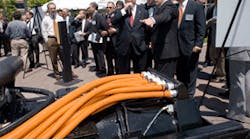WASHINGTON, D.C. – Secretary of Energy Sam Bodman helped showcase several diesel-hybrid and clean diesel trucks here in the nation’s capital at a special event yesterday to highlight advances generated by the Department of Energy’s (DOE) 21st Century Truck program. The program was designed to spur development of environmentally friendly, yet fuel efficient propulsion systems for commercial vehicles.
“As many of you know, U.S. highway transportation is over 97% dependent on petroleum for its energy, with about one-quarter consumed by heavy-duty vehicles,” Bodman said. “Over half of our petroleum is imported, which impacts our security and our trade deficit. Without significant technology development, [DOE] is forecasting that heavy truck petroleum use will increase by 40% by 2020 and will double by 2050 relative to today.”
He pointed out that the vehicles on display at the event can help not only reduce the trucking industry’s petroleum consumption but also reduce exhaust pollution.
Oshkosh Truck displayed a 66,000-lb. heavy diesel-electric hybrid chassis designed for refuse applications powered by a 300-hp. Cummins ISB engine connected to the company’s ProPulse electric drivetrain. This offers 40% better fuel economy versus a similar diesel engine-only chassis.
Ford Motor Co. demonstrated an F-550 diesel-hybrid chassis designed to serve as a UPS delivery truck, offering 60% to 70% fuel economy improvements for in-city driving. Ford also highlighted a diesel-electric hybrid version of its super-size SUV, the Excursion, which cuts fuel use by 85% compared with a gasoline engine-only version.
Cummins exhibited the 2007 version of its 15L inline, 6-cyl. ISX engine, powering an International 9900ix 72-in. high-rise sleeper tractor. The vehicle was equipped with Cummins’ experimental ComfortGuard diesel-powered APU, a factory-installed generator that can power the truck’s air conditioning, heating, and other onboard systems without the need to idle the engine.
Caterpillar displayed its MorElectric truck system, a separate HVAC system installed on an international 9200i tractor equipped with a 410-hp. C-13 engine that helps improve fuel economy by reducing parasitic loads on the engine.
International Truck & Engine had a 4200 medium-duty diesel-hybrid four-door crew cab truck equipped with a dry van freight body for P&D operations on hand. The Class 6 truck uses a 175-hp. 3L liter inline, 4-cyl. paired with a parallel hybrid drivetrain developed by Eaton instead of the standard 375-hp. VT 365 6L V8 diesel, giving the truck 40% to 60% better fuel economy.
“Stop-and-go operations is where hybrids like this thrive,” Jon Hembree, International’s engineering program manager for hybrids, told Fleet Owner. “You use the electrical system to supplement at acceleration, so that allows you to downsize the diesel engine and thus improve fuel economy.”
Finally, Volvo Truck North America showed off its VN 780 Tech Truck, which offers a separate HVAC system that can use shore power for operation, thus eliminating the need to idle the engine to heat or cool the cab.
“You need just two kilowatts of power to run the cab cooling and heating system versus a gallon an hour idling the engine,” Skip Yeakel, a Volvo spokesman, told Fleet Owner. “You can save up to 2,200 gallons of fuel per year this way.”
“The action is really in diesel power now in terms of fuel economy and emission benefits,” Allen Schaeffer, executive director of The Diesel Forum, told Fleet Owner. “There’s a real sea change going on where diesels are concerned. For example, look at General Motor’s new diesel-hybrid bus – not only does it save fuel, it has better durability. A typical diesel-only city bus averages a road call every 1,700 to 2,000 miles of operation. With these diesel-hybrids, the average jumps to 7,000 miles.”
The DOE is continuing to fund a range of clean diesel and diesel-hybrid initiatives through $175 million in grants awarded this February for 12 projects. DOE’s Bodman noted that industry partners are putting forth almost $90 million in cost sharing in those efforts.
“These vehicles encompass a wide range of technologies being developed by the 21st Century Truck partnership,” he added. “Ultimately, we seek safe, secure, and environmentally friendly trucks and buses that use sustainable and self-sufficient energy sources. If the technologies currently being researched can reach commercial maturity and market acceptance, we believe we can increase the fuel economy of the best new long-haul trucks by more than 50% in the next fifteen years.”



